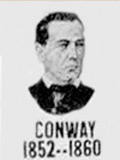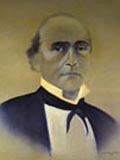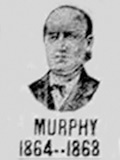State Governors 1852 - 1874
State Governors 1852 - 1874
Elias Nelson Conway
 Born: May 17, 1812, at Greeneville Tennessee
Born: May 17, 1812, at Greeneville Tennessee
Died: February 28, 1892, at Little Rock, Arkansas
Buried: Mount Holly Cemetery, Little Rock, Arkansas
Served: 1852-1860
Brother to Arkansas's first governor, Elias Conway was born at Greenville, Tennessee, on May 17, 1812. He moved with his family to Missouri in 1818. In 1833 Conway moved to Little Rock, studied surveying was appointed U.S. Deputy Surveyor, and served as Arkansas' auditor from 1835 to 1849. Conway declined the 1844 Democratic gubernatorial nomination, but accepted it in 1852. He was sworn into office on November 15, 1852, as Arkansas's fifth governor, and was re-elected to a second term in 1856. During his administration, the office of state geologist was created, major improvements were made to the state's roads and also in the state penitentiary, and large land grants were given to the state's nascent railroad system. His greatest accomplishment was restoring the state's solvency, which he did by creating a court of chancery to settle the affairs of the ill-managed state Real-Estate Bank. Despite a huge remaining bonded indebtedness, the treasury held a cash surplus when Conway left office on November 16, 1860. After leaving office Conway retired from public life. His death in 1892 brought an end to the "family dynasty" of Johnson's, Conway's, and Sevier's that had been a conspicuous feature of pre-Civil War Arkansas politics.
Henry Massie Rector
 Born: May 1 1816, at Fountain Ferry, Kentucky
Born: May 1 1816, at Fountain Ferry, Kentucky
Died: August 12, 1899, at Little Rock, Arkansas
Buried: Mount Holly Cemetery, Little Rock, Arkansas
Served: 1860-1862
Born and educated in Kentucky, Henry Rector relocated to Arkansas in 1835 to manage lands he had inherited from his father, a land surveyor and speculator. In 1842, Rector was appointed U.S. marshal for Arkansas and in 1848 was elected to the state Senate. through the 1850s, Rector remained active in politics and the law; in 1859 he was elected to the state's Supreme Court. In 1860, Rector stood for governor and won against a candidate fielded by the Johnson-Conway-Sevier "Family" political machine. In office, Rector proved a reluctant secessionist, although he authorized the seizure of U.S. arsenals in Little Rock and Fort Smith. After the secession vote of May 6 1861, Rector headed the state's mobilization, cooperating with the ardent secessionists of the "Family." In October 1862, Rector campaigned once more for governor (the constitution adopted by the Secession Convention in 1861 had shortened the governor's term to two years). Rector lost the election and on November 3 1862 submitted his resignation to the Legislature. During the war, Rector served as a private soldier in the state's reserve corps. After the war, Rector returned to cotton farming and served in the Constitutional Convention of 1874.
Harris Flanagin
 Born: November 3, 1817, at Roadstown, New Jersey
Born: November 3, 1817, at Roadstown, New Jersey
Died: October 23, 1874, at Arkadelphia, Arkansas
Buried: Rose Hill Cemetery, Arkadelphia, Arkansas
Served: 1862-1864
Son of an Irish-born cabinetmaker, Harris Flanagin taught mathematics and studied law in Pennsylvania before relocating to Arkansas in 1839. Settling in Arkadelphia, he practiced law, speculated in land and briefly dabbled in politics during the 1840s and 50s. He was selected to the secession convention in 1861 and although a reluctant rebel, became captain of a company of the Second Arkansas Mounted Rifles, seeing action in the battles of Pea Ridge and Wilson's Creek. In the summer of 1862, Flanagin was promoted as a gubernatorial candidate by former Unionists, Whigs and Democrats unhappy with the clumsiness of the Rector administration. Flanagin did little to promote his own candidacy, but won handily. Once in office, Flanagin urged the legislature to come to the aid of soldiers' families, to stabilize the state's finances and to suppress profiteering and illicit liquor-making but generally took a passive approach to exercising executive powers. In 1863, as Union forces advanced upon Little Rock, Flanagin simply went home to Arkadelphia, assuming that his duties were finished. He was recalled by Confederate authorities, however, and presided over the Legislature's 1864 session in Washington. At the end of the war Flanagin worked to insure an orderly return to peacetime conditions, returning to his law practice. In 1874 he served as a delegate to the state's constitutional convention, but died before its final ratification.
Isaac Murphy
 Born: October 16, 1799, at Pittsburgh, Pennsylvania
Born: October 16, 1799, at Pittsburgh, Pennsylvania
Died: September 8, 1882, at Huntsville, Arkansas
Buried: Unknown location
Served: 1864-1868
A native of western Pennsylvania, Murphy was educated at Washington College, later practicing law and teaching school in Pennsylvania and Tennessee. In 1834 Murphy and his family relocated to Fayetteville, where he established himself as a school teacher, surveyor, and lawyer. Murphy was elected to the General Assembly of Arkansas two times as the representative from Washington County in 1846 and 1848, later relocating to Huntsville. In 1861, Murphy was selected for the Secession Convention. Murphy was ultimately the only delegate to vote in favor of staying in the Union. Upon the fall of Little Rock an election was held with the approval of President Lincoln and Murphy was elected governor. During the Murphy administration Arkansas began healing its war wounds even as the war continued in the southern parts of the State. Murphy took a low-key approach to governance and stated publicly that "We have all done wrong." By the start of 1866 Murphy's plans began to erode: The elections of 1866 saw a pro-Confederate legislature elected which increased Murphy's problems dramatically. Murphy decided to remain in office and worked for the best interests of the State while taking abuse from both sides. When Murphy left office his administration left a budget surplus even though his administration had begun with no funds. This surplus evaporated soon after his successor took office. Murphy returned to Huntsville and took up farming and practicing law once again and lived a quiet life with his family. On 8 September 1882 Murphy died unexpectedly at his home. Even former Confederates remembered him fondly in later years and textbooks that berated the "carpetbagger governments" reserved kind words for Isaac Murphy.
Powell Clayton
 Born: August 7, 1833, in Bethel County, Pennsylvania
Born: August 7, 1833, in Bethel County, Pennsylvania
Died: August 25, 1914, at Washington, D.C.
Buried: Arlington National Cemetery, Washington, D.C.
Served: 1868-1871
Powell Clayton, a native of Pennsylvania, arrived in Arkansas in 1863 as a young Union cavalry officer. He bought property near Pine Bluff and remained in Arkansas after the war's end. Clayton was instrumental in the founding of the Arkansas Republican party and in 1868 was its candidate for governor. The gubernatorial election in that year was conducted with the referendum on ratifying the state's first Reconstruction constitution (which restored the governor's term of office to four years); on March 26 the people voted and on April 1 Clayton was confirmed as governor. In office, Clayton used patronage effectively to build a wider partisan base, putting Republicans into appointive offices whenever possible. during his service the Legislature enacted many significant measures, including levee and roads improvements, swamp reclamation, establishment of free public schools and schools for the deaf and the blind, as well as a prohibition of racial discrimination in transportation, housing, education and restaurants. Clayton's administration is better remembered, however, for controversies such as the declaration of martial law by the governor in response to the rise of the Ku Klux Klan, accusations of corruption in state aid to railroads, and bitter factional fighting within the newborn Republican Party. In 1871, Clayton sought and gained a U.S. Senate seat from Arkansas. At the end of his term Clayton returned to Arkansas and the leadership of the state Republican party, controlling federal patronage in the state and effectively establishing the tradition of "Post Office Republicanism." In 1897 Clayton was appointed ambassador to the Republic of Mexico and served until 1905, when he resigned and retired to Washington D.C. where he died at the age of eighty-one.
Elisha Baxter
 Born: September 1, 1827, in Rutherford County, North Carolina
Born: September 1, 1827, in Rutherford County, North Carolina
Died: May 31, 1899, at Batesville, Arkansas
Buried: Oak Lawn Cemetery, Batesville, Arkansas
Served: 1873-1874
Elisha Baxter, a merchant, settled in Arkansas in 1852. During the 1850s Baxter read law and became involved in Democratic Party politics, serving in the state legislature and as a prosecuting attorney. During the Civil War Baxter was a lukewarm Unionist; after the war, he helped establish the new Republican party and was rewarded with political appointments. Baxter's rise to prominence resulted from factional fighting within the Republican party; in 1872, the "regular" Republicans were challenged by an insurgent movement opposed to party corruption at the national level and to Powell Clayton's harsh executive style as governor. The insurgent or "Brindletail" faction's gubernatorial candidate was Joseph Brooks, an Iowa-born "carpetbagger." Baxter was chosen as the "Regular" candidate and in the election of 1872 the official candidate, though widely disputed, vote count favored Baxter who was declared the winner. Once in office, Baxter sought to conciliate his old opponents, Republicans and Democrats alike, but could not silence challenges to the legitimacy of his election. His overtures to Democrats, plus a controversial refusal to issue railroad bonds, united Republican opposition toward this Republican governor. In April 1874 Baxter was physically removed from the State House and Brooks was sworn in as Governor by the chief Justice of the Supreme Court. In the month that followed, the two governors' supporters clashed but ultimately President U.S. Grant upheld Baxter's legitimacy in office. He returned to the State House on May 15 to finish his term. In the summer of 1874 a new constitution was drafted and submitted to voters, one which once again shortened the governor's term to two years. Baxter was twice offered and twice refused the 1874 Democratic-Conservative gubernatorial nomination. He remained slightly active in politics for a few years more but ultimately retired to his farm near Batesville where he practiced law until his death.




